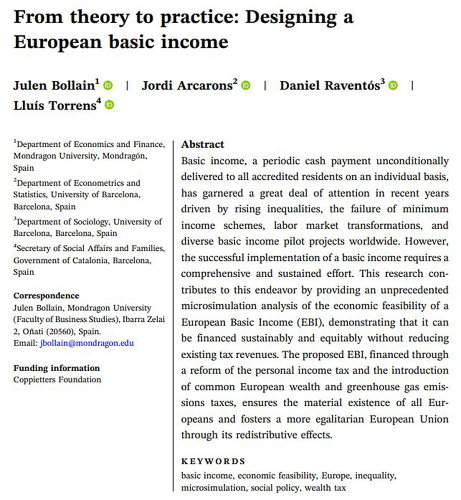
by Julen Bollain | Dec 17, 2024 | Research
A pioneering study has been published, providing the first comprehensive analysis of the financial feasibility of a European Basic Income (EBI). The research demonstrates that guaranteeing the right to existence for everyone in the European Union (EU) is not only economically viable but also promotes a more equitable and cohesive Europe.
Basic income—an unconditional, periodic cash payment to all individuals—has gained significant attention as a potential tool to address rising inequality, poverty, and labour market transformations. Despite increasing interest, no study until now has examined the financing of an EBI at the scale needed to ensure the material existence of all EU residents.
Key findings of the study:
- Eradication of poverty: The proposed EBI would eliminate poverty across the EU.
- Redistribution of wealth: The Gini index, a measure of inequality, would improve significantly from 0.3756 (pre-EBI) to 0.3000 (post-EBI).
- Benefit for the many: 63.2% of European households would see an improvement in their economic position, with the impact concentrated among the most vulnerable.
- Affordable cost: The total cost of the EBI is estimated at just 2.71% of the GDP of the EU-26.
The EBI would be financed through a combination of tax reforms, including adjustments to income tax, the introduction of a European wealth tax, and a greenhouse gas emissions tax. Crucially, the study demonstrates that these measures can fund the EBI sustainably without reducing existing tax revenues.
This research marks a critical step in proving that a European Basic Income is not only a utopian ideal but a realistic policy solution to create a fairer, more inclusive society. By addressing economic disparities and ensuring material security for all, a EBI could strengthen social cohesion and advance the European project.
The study also emphasizes that the redistribution achieved through the EBI would benefit the majority of the population while limiting losses to the wealthiest deciles, ensuring equity and fairness in its implementation.
About the study
The research was conducted by Julen Bollain, Jordi Arcarons, Daniel Raventós and Lluís Torrens and published in Poverty and Public Policy. It utilises a robust microsimulation model to analyse the financial and social impacts of the EBI, drawing on data from across the EU-26.
To read the full study, click here:
Correspondence: Julen Bollain, Mondragon University (Faculty of Business Studies), Ibarra Zelaia 2, Oñati (20560), Span. To send Julen an email, click here

by Jurgen De Wispelaere | Nov 4, 2024 | Research
Photo by Anastasiia Chepinska on Unsplash
Article by Jurgen De Wispelaere, Joe Chrisp, and Leticia Morales in Global Policy
Abstract: This short paper reflects on the key lessons we can learn from the political debate around and policy experimentation with (emergency) basic income schemes in the context of the COVID-19 pandemic. While the pandemic crisis initially seems to have opened up a policy window for introducing a basic income as a crisis instrument, theoretical arguments and empirical observations strongly suggest the reliance of some basic income advocates on crisis events, such as the pandemic, to push forward their policy ideas involves wishful thinking rather than political reality. A feasible roadmap towards introducing basic income requires the hard work of raising public awareness, constructing broad constituencies, and building robust political coalitions rather than waiting for the next crisis to come around the corner.
To read the full paper, click here.

by Peter Knight | Aug 27, 2024 | Research
“Universal Basic Income (UBI) policies have the potential to promote a wide range of public health objectives by providing those who qualify with direct cash payments. One overlooked mechanism of particular importance to health researchers is the possibility that guaranteed income might increase consultation of primary and preventive care (e.g., annual doctors’ visits; regular vaccination against infectious disease) by providing people with both the time and monetary resources to do so, thereby improving general health.
This study assesses the effects of an exogenous shock to Alaska’s UBI payments to all state residents: a 2022 decision to reclassify dividend “energy relief” provisions as non-taxable (thereby increasing payments by approximately $2,000 inflation-adjusted dollars). It estimates quasi- experimental treatment effects (in 2022 vs. 2021) via mixed linear probability models that compare pre/post policy change in primary care seeking behavior in Alaska vs. the US adult population; controlling for respondent-level fixed effects and state-level random effects. Data were collected in 2021-2022, and analyzed in 2024.”
To read more, click here.

by Guy Standing | Aug 5, 2024 | Research
By Guy Standing
In July 2024, the National Bureau of Economic Research issued a report from the researchers on an income-transfer project conducted in Illinois and Texas. It has generated global attention, with some commentators saying it undermines the case for basic income, others that it supports the case for it.
This note is a critique of the project, and one point should be made very firmly at the outset: This experiment was not a test of basic income. Anybody claiming otherwise is either unfamiliar with the concept of basic income or is being disingenuous.
To be fair on the researchers, the title of their main report refers to a ‘guaranteed income’, not a basic income. But as far as I can see none of the researchers has rebutted the interpretation by critics. Moreover, as this writer knows, having been involved in the initial discussions of the project in Stanford University, the initial researchers knew they could not do a proper basic income pilot.
To read the full article, click here.

by Scott Santens | Aug 3, 2024 | Research
The results of one of the biggest basic income experiments ever came out in July 2024, and as usual, the nuances of the findings are lost among the voices of those loudly proclaiming basic income doesn’t work. This one is the three-year pilot of Sam Altman’s that provided $1,000 a month to 1,000 people in Texas and Illinois and compared that group to a control group of 2,000 people who got $50 a month. Every participant was between the ages of 21 and 40. In this article, I will explain the nuances and how the results of this pilot provide some new info but mostly replicate the findings of previous experiments going back to the 1970s and only further demonstrate that what’s at stake here is real freedom and the perceived danger it poses to those who benefit from the widespread lack of that freedom.
To read the full article, click here.

by Peter Knight | Jun 21, 2024 | News, Research
“A monthly payment of $750 to $1,000 would allow thousands of the city’s homeless people to find informal housing, living in boarding homes, in shared apartments and with family and friends, according to a policy brief by four prominent Los Angeles academics.”
To read the full Los Angeles Times article by Doug Smith, click here.







